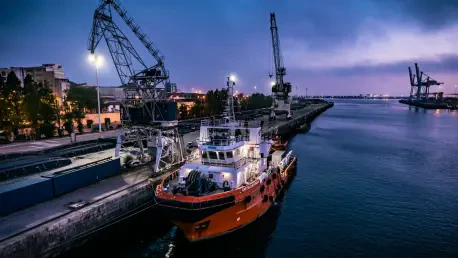The maritime insurance industry, crucial for safeguarding global shipping networks, is now standing on the cusp of a technological makeover. In an era where AI is making significant strides across various sectors, maritime insurance is no exception. Firms like Ceto have emerged, leveraging advanced AI-powered predictive analytics tools that not only streamline operations but also promise to make maritime activities more efficient. This transformative shift is supported by impressive investments, such as Ceto’s recent $4.8 million funding, suggesting a growing consensus on the potential benefits. The maritime industry’s commitment to modernization is driven by the need to replace outdated methods, heralding a new era of risk management and operational efficiency.
The Role of AI in Revolutionizing Risk Assessment
AI’s Contribution to Risk Evaluation
One of the most profound impacts of AI in maritime insurance is illustrated through its advanced risk assessment capabilities. Traditional methodologies that have been entrenched in the industry for decades are gradually being overshadowed by automated systems that provide deeper insights into shipping operations. These systems employ real-time data to predict risks with improved precision, helping insurers to set more accurate premiums and reduce incidents of machinery failures. Importantly, AI-driven platforms like Watchkeeper analyze vast streams of data to enhance ship tracking, thus ensuring that potential threats are identified early. This integration of AI not only promises more reliable insurance outcomes but also plays a crucial role in optimizing fuel efficiency, all while contributing to a sustainable environment.
Enhancing Decision-Making in Maritime Operations
AI’s impact extends beyond the confines of risk evaluation by equipping stakeholders with powerful tools for decision-making. Real-time insights provided by these platforms allow operators and insurers to make timely, informed decisions that significantly mitigate risks. As the digital dashboard becomes integrated into maritime operations, stakeholders gain access to an array of data-driven solutions that enable precise navigation through complex insurance claims. Additionally, by managing emissions through tools like CarbonID, the industry can align better with environmental goals, reducing the carbon footprint of maritime transport. This holistic approach to decision-making empowers all parties involved, fostering transparency and accountability across global supply chains.
Transforming the Insurance Product Landscape
Creating a Connected Insurance Ecosystem
The development of a connected insurance ecosystem stands as one of AI’s revolutionary contributions to maritime insurance. With platforms like Ceto, insurance products are built on interconnected systems that link ship performance data directly with coverage metrics. As data is continuously fed into a centralized system, insurers are equipped to tailor products specifically to a ship’s operating profile and condition. This results in more accurate and adaptable insurance policies that respond to real-time changes within the maritime environment. Such a systematic approach not only aligns with modern technological standards but also enhances the industry’s ability to adapt to emerging global challenges effectively.
Implications for Global Trade and Supply Chains
The implications of AI’s integration into maritime insurance extend far and wide, affecting global trade and supply chains at large. Given that maritime operations account for an overwhelming majority of the world’s trade volume, optimizing insurance practices through AI helps ensure smoother transactions and operations. The ability to predict and mitigate risks through connected data analytics translates into fewer disruptions within the supply chain, enhancing its resilience and sustainability. Furthermore, the hiring of seasoned professionals, like Bob Clarkson at Ceto, underscores the industry’s commitment to deepening its expertise as it scales operations to meet growing demands. As AI continues to reshape maritime insurance, global supply chains stand to benefit, promoting a future marked by agility and innovation.
Navigating Toward a Smarter Maritime Future
The maritime insurance industry, pivotal in protecting global shipping networks, is poised for a significant technological transformation. As artificial intelligence makes remarkable advancements across diverse sectors, maritime insurance is not immune to its influence. Companies like Ceto are spearheading this change, utilizing sophisticated AI-driven predictive analytics tools. These tools not only optimize operations but also enhance the efficiency of maritime activities. Substantial investments, such as Ceto’s fresh $4.8 million funding round, underscore a growing agreement on these technologies’ promising benefits. The industry’s dedication to modernizing stems from a pressing need to abandon outdated processes, thereby ushering in an era marked by improved risk management and enhanced operational efficiency. This shift reflects not only technological evolution but also a strategic rethinking about safeguarding maritime commerce amid ever-evolving global challenges, setting the stage for a more resilient future in shipping.









